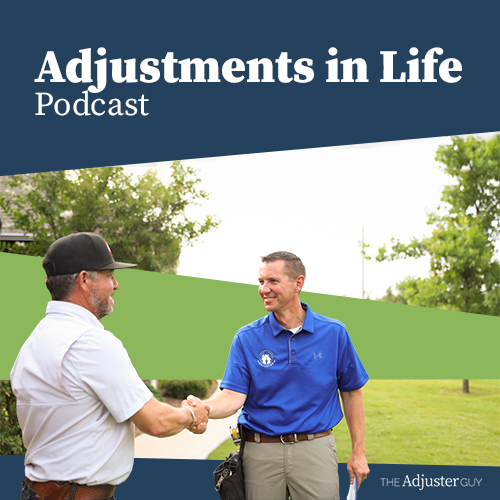[
Links
- Robert Moran on LinkedIn: https://www.linkedin.com/in/robert-moran-802804b/
- Alacrity Solutions: https://www.alacritysolutions.com
Transcript
Alan: You know one of the reasons for the inspiration behind this podcast is to help you guys out there—the listeners—to hear for yourself the accomplishments that can be achieved among the claims industry. Not only from me and what it what I can advise you of those things, but from those that I was fortunate enough to be able to surround myself with.
One of the most important things you can do in this business is make every attempt to surround yourself with the most knowledgeable people in the industry. Everybody out there can give you their opinion—what they think you need to do in this business—but it’s the industry leaders that have always been those who have proven themselves to be the most successful at one time among the adjusters.
These are the folks that you guys out there need to be surrounding yourself with; and by doing so, you can insure yourself that you’re observing and can carry that success among yourself to set an example for others down the line.
Today, I have a guest on the show that’s not only one of the most influential people I was able to find amongst the industry; but ended up becoming a good friend, and a person that I was able to depend on to ensure that I was able to keep my family fed through the years. He’s a huge role player in a lot of my success that I’ve been able to obtain throughout my career.
So I’m going to welcome on Robert Moran of Alacrity Solutions. Robert thanks for joining.
Robert: Alan, thanks so much for having me. And those were very very kind words.
You know what we certainly have worked with each other over the years in many different scopes. And you know certainly enjoy our relationship without a doubt and really enjoyed working with you as well. So I hope we can provide some insight into and provide clarity into what you know some of the things that you were trying to accomplish by having this podcast.
Alan: To a lot of the listeners that are going to be hearing the show most of them are new to the trade—maybe—or maybe they’ve been around for a while and not been involved with Alacrity. You know things management-wise and how the firms structure themselves have changed a lot since I’ve been in this.
And with the management structuring that’s changed and been implemented over the years, can you kind of explain what your role is with Alacrity?
Robert: Absolutely, so from my perspective, I primarily manage a lot of our operations—specifically in relation to the field aspect of it. Servicing many different carriers from that side of things, but also ensuring that we have the adequate amount of resources from the field side of things.
I’ve been with Alacrity since,you know, 2011; and I’ve seen us grow in many different aspects over the years. Certainly through acquisitions—so through you know partnerships and the relationships that we’ve built.
Certainly, you know, clients have demanded us to grow. We definitely grow on our own—there is growth organically—but you know a lot of our carriers certainly have demanded us to grow from that perspective.
That kinda tails into how my role is from an organizational perspective than anything else. So I have client managers, I have account managers—they all service specific carriers. So were able to provide the attention that’s necessary for each individual carrier—obviously each carrier is different.
Certainly, from a leadership perspective, they provide that over to the carrier. They service as needed, but also manage the field operations form that perspective.
It’s an aspect of quality, an aspect of scalability, you know, certainly consistency as far as our management is concerned, and then, you know, the different types of service offerings that Alacrity provides.More so than anything else, it is about those relationships; and you know certainly the operational aspect of things that my role really, really encompasses then than anything else.
It’s a relationships with the field, its relationships with the carriers than anything else, and certainly keeping up to date as far as communication aspect across the entire enterprise.
Alan: Can you kind of give us a background? Can you give us—everybody’s got a story. So what’s your story? Where did you come from and what were the steps that developed over the years that got you to your position?
Robert: That’s—hopefully I won’t take too long getting into that, but I’ll try to be as brief as possible.
My dad, he originated in retail; and we really moved as a family, moved across the country—basically, every four years for the most part. So we’re a pretty close-knit family.
My dad always had a strong work ethic, and I contribute a lot of my success to him. and I probably wouldn’t have admitted that maybe 10 years ago or so but certainly as you reflect back, everything else—that work ethic—it stays with you without a doubt.
I ended up going to high school in New Jersey. We bounced around from state-to-state and everything else.
Because we bounced around so much, we really had to rely upon our family more than anything else. Fortunately, I was able to—from New Jersey my parents moved to Alabama. There I actually went to school—went to college there—Roll Tide. From that aspect of it, I graduated in 2004 in a Healthcare Management major.
So I didn’t—I was already on the Five-Year Plan as far as from a Healthcare Management major. If you really wanted to take that next step up, you had to go back to school and get your graduate degree.
I really didn’t want to do that. I wanted to start off my life. I really wanted to carve my own path and everything else.
It wasn’t—it was different times back then. There wasn’t too much opportunity for my Health Care Management major or anything along those lines.
I found myself pretty much in the latter part of 2004 into 2005 having an opportunity in insurance at Allstate—training to become an adjuster. It was kind of the right place at the right time.
I really didn’t know what to do with my life or anything along those lines. I just knew I wanted to make money. I already had you know the construction background. I was putting myself through school too as well doing odd jobs and everything else.
That was kind of the start of it as far as how i got into the industry. It was really—that was the option I had a time as far as being in Birmingham, Alabama. I liked the customer-facing aspect, the auto perspective, as well as the property perspective—i really enjoyed that. And I really enjoyed being able to travel from a regional perspective and everything else.
They gave me the necessary training that I needed and also the tools that I needed to utilize to be successful with it and everything else. I wanted to expand out from that portion.
Actually a former friend of mine had a sister—she worked for a competing firm with us and then Katrina happened in 2005. Essentially that’s that’s when I made my shift into the independent world in 2005 when Katrina hit.
I worked that event, moved over to Wilma, got my opportunity to move up from a management perspective, and really ever since then probably 2006 to 2009 or 2010 I was in the management side of things from the independence catastrophe operations of perspective in everything else.
I moved from different offices in Florida to Illinois, built up a really good relationship with folks in between and then one of our original offices unfortunately move to Texas. I really wanted to get back into the field of things—back to being a staff adjuster for another carrier which was Liberty Mutual and SafeCo.
So I enjoyed that—I always enjoyed that aspect of working and deploying around too as well. Many different aspects of that the job you have to rely on yourself without a doubt. And certainly different deployments had come up. I enjoyed Montana hail, I enjoyed that environment from Billings to you no other areas you know that was around the time when Arizona hail hit too as well and then you get transferred over.
There’s just so many different aspects of that job that you love and i went back to doing it back in 2010 to 2011. THen I actually got an opportunity with NCA Group. I was actually deployed to Texas. They knew my background as far as a from a storm operation perspective and everything along those lines. It really wasn’t looking.
I was actually deployed for a hail storm in Dallas. I flew up to Indianapolis to work with my current company as far as that is concerned. I met Jeff Schmidt on that in Pearl on the executive leadership group that is still around here today.
In 2011, they brought me on as an associate director of CAT claims and pretty much have been moving up ever since as far as within the same company that was NCA Group that merged with RMJW merged with Worley as well too. Where we’re at now today with all of our mergers and Acquisitions bein Alacrity Solutions.
It’s kinda hard to break down as quickly as possible, but that’s kinda a quick shot of my background.
Alan: Well, that definitely proves that with good intentions and hard work, there is opportunity out there for people to advance to just about anywhere they want to go within the industry if they’re willing to put forth the effort and recognize the opportunities when they come along, that’s for sure.
Robert: There are always opportunities that certainly present themselves. There’s so many different aspects of this business that I continue to learn to this day.
I’m just going to bring up a quick example. We’re operationally managing right now because of the current circumstances that ran from covid-19. We’re handling an aspect of the business that we never handled before from a travelers insurance perspective—meaning insurance associated with traveling overseas from a policy standpoint.
This particular carrier had a bunch of those policies and everything along those lines. We’ve been able to staff and fill that from a desk perspective.
In my 15 to 16 years, have I ever expanded into that policy type or anything along those lines? No. But different things do come up and different circumstances do come up too as well and different opportunities always come up along those lines. You’ve gotta put yourself out there.
Alan: That’s actually a good segway into the next question i have for you. PEople are consistently coming to me saying ‘Hey, I need information especially now that storm season is active. What do i ask these firms for?What direction do I go?’
From Alacrity standpoint, what are the opportunities that some of these aspiring adjusters could see coming up throughout the year deployment-wise? What are the different avenues that could possibly be an option to them?
Robert: So there’s always different avenues—it’s not the easiest you know as far as being a being a new adjuster with in this industry and how much as you both know it changed yesterday, it changed six months ago, it changed a year ago, it changed two years ago, it changed five years ago. It’s a completely different landscape, but there’s also different opportunities that can certainly come into play.
Obviously you know what we look for from a new adjuster perspective is having you know at least that base—that bass into you have that construction knowledge, you have the Xactimate experience, you have the policy base from that side of things.
That doesn’t necessarily always translate into an opportunity. Really what translates into an opportunity is you know like I mentioned before in the past relationships that you build. A lot of that has to do with Resource Management. Darby Day who was our resource director—she is a great person to network with within the company. She’s somebody that I rely on and talk with on a regular basis.
Solving for different things and different opportunities that do come up and positioning for the right resource for the opportunity that’s in front of us. It is a networking aspect of it.
But as far as options are concerned, the way Alacrity has expanded from a service offering perspective, it’s really designed to meet that industry changing needs. What I mean when I say that, form that perspective, is being able to take that first notice of loss and also put on that last coat of paint, as Jeff Schmitt would say. And somebody that’s very much influential in my life as well that has that leadership style that’s able to allow people to grow from that perspective and Jim Pearl is the same way.
There’s always that aspect of if there’s property daily claims that we handle in all 50 states. We handle Auto catastrophe claims in all 50 states.There’s commercial claim handling associated with the daily catastrophe from an opportunity standpoint.
We obviously have direct repair solutions as we continue to partner with different companies. That certainly has expanded different types of service offerings that we do have.
Another one of those is contents inventory. We do a lot of contents inventory. There’s photo only capturing associated with that. We do have core adjusting for desk review services, so I end up—from a review side of things—really we look for experience more so when you’re reviewing the product prior to it getting to the carrier. So there’s a huge emphasis on quality.
W. Earl, our VP of quality assurance, has been instrumental in how that segment of our business carries over to the product that we send to the carriers. That’s all we hear these days. It’s all about speed and accuracy.
There’s always those opportunities from a review side of things, but more so not from a new adjuster getting into the business from a review standpoint. Outside of that, there’s always specialized desk review services that we do have, heavy equipment, specialty vehicles, diminished value, something along those lines.
We also have specialty evaluations, building consultant, we do have scope only out there too as well. That’s probably a little more suited for that entry level adjuster. There’s auto daily handling as well.
We also have a call center services. We do virtual collaboration and inspection and ladders services as well.
There are different methods of inspection as far as from the field side, if that’s what you want to do from a field aspect of it. That could be a potential start into it.
We’re not huge on anything along those lines. We’re huge on the traditional IA field services, but we certainly expand out what are our offerings are from a different type of method of inspection than anything else.
Kinda get the break down into the different type of things that we do offer and the opportunities that could benefit the people listening in on this call.
Alan: So going back to the changing industry, I can speak for that that it’s ever changing—constantly you know. Just the way we handle claims the way we look at how we estimate based off of the improvements and materials. Technology alone—I emphasized incredibly high amounts to these adjusters.
Not even the new adjuster, but to the jesters that have been around for a while. Stay up with the times. Stay with the new technology, because that’s where this business is going.
From the standpoint of Alacrity, in your words with how much would you say to emphasize—I mean, I can tell these guys till I’m blue in the face but to hear it out of the mouth of the firm speaks bounds you know to these guys in it. So what would you say, how much would you emphasize on keeping up with the technology that’s being offered out there.
Robert: It seems like everybody’s got their own app. They have their own different ways of shortening any gaps within the claims-like cycle or shortening any gaps within the ecosystem of the entire claims process and everything else.
I feel like, always that base is going to be that estimating platform you have, and how you have tied into different types of things from a technology aspect.
As you hit it Alan, the technology is changing. Right now what you see is that theres certainly private equity groups that are pumping money into the insurance industry of how they can just improved inefficiencies associated with the cost as well.
There are specific products that focus in on nothing but quality—one of which is accurate settle assist or accurate QA assist. That is the standardized way you handle things from an app perspective or from a standardized the audit perception as far as swine that claim is uploaded and what it kicks back to you from an algorithm in order to improve the quality of the product.
There’s not really that leakage from an over/underwrite perspective that’s going through. Other technologies that certainly have come into play are certain types of claims experience—where it’s like a B-to-B system that the customer has that you’re able to—with their permission—get into their phone and walk them around, taking photos of different aspects—that allows different types of claims to be adjusted from the inside.
I mention that because you need to be aware of that to offset different things that you might have more of an opportunity from a desk as opposed to the field or vice versa depending on what brings into play. Obviously, technology is there for enhancement is going to initially disrupt or try to see what that industry looks like than anything but it’s always going to what is always going to be there.
Property, as everybody says, property’s always going to be behind Auto. You kind of see where auto is at. But you can’t necessarily get that boots on the ground type aspect associated with hopping on that roof, assessing what that damage looks like, and being able to provide that clean sheet over to where the carrier is ultimately.
That’s what it comes down to. More than anything you know what Alacrity invests in more than anything else e are in the enhancements to our data. We want to see—we want to have the best data in industry in order to have—that’s the reason why we asked a million questions with with our profile setup.
What is your experience with large loss? What is your experience with this peril, this peril, this peril? Have you’ve done appraisals?
There’s so many different aspects of your job and what you can potentially be experienced in that we want to ask what position that is for you or what you have the most experience with. What I say that some folks that are new to the industry have an HVAC background. There is different things the carriers asks for us, ‘Hey, do you have a network of HVAC specialist that can come out and assess condenser units for a hail storm that impacted the Oklahoma City area.
There’s different—there’s always those those different things that do pop up and we want to ensure that our system is most up-to-date than anything else. Really is that what it’s really about from our perspective than anything else is that is that a data analytics side of things and aligning our technology resources so that we had a best man for the job.
That’s really what it comes down to and obviously you know when there are lines we certainly have the best leadership in the business—best management in the business from that perspective. We’ll train you up one way or another once you do get that opportunity for sure.
Alan: I strongly believe that at first it looks like this technologies is trying to take those of us who are in the field out of the field and take those opportunities away from us. I strongly believe that if we looks at this technology and we’ll use it, we’ll figure out that we can better ourselves and capitalize on it more with the technology then without it.
I think what we have coming forward and what we’ve seen has been nothing but a plus to the industry.
Robert: I mean, as far as jumping into a bit of that, its—sure, if i go back to 2010 as far as that a lot of what we were doing it from a field perspective were water backup claims. So a lot of the water backup claims, they have $500 to $5,000 limits and everything else.
That’s what what adjusters love the get. We love to go on a event, do some quick hitting water backup claims and everything else.
Well. What changed was a lot of those water backup claims could be assessed from a desk. Well what that did will certainly give opportunities to a desk and vice versa as well.
Different types of positions from the ecosystem perspective as far as water mitigation that certainly evolved into that and other things do come up from different types of methods of inspection without a doubt.
To say that boots on the ground will be replaced is completely inaccurate and something that’s going to continue to evolve as fas as what that role looks like. I don’t have a crystal ball, but that’s certainly going to be a necessity.
Alan: So training. Even adjusters who have been in this awhile theres always opportunities for training—there’s always different things that we could get a hold of that could make us more successful in we do whether it be at the desk or in the field. What’s some training opportunities or what does Alacrity have to offer?
Robert: there’s always different classes that pop up that I would very much points folks over to in our Arlo website from a profile perspective. Ever since we did change our name, it revamped our website to as well which also gave different opportunities from a training perspective.
There’s on there currently from a universal perspective there’s different types of certifications that are on there. We kind of offer relatively the same things as most—there’s Xactimate online training that bridges stuff on over to obviously Xactware. There’s—that’s from a universal perspective from our side of things, we’re certainly not trying to train the industry per say.
Once you do have that opportunity a lot of our training is done kind of in house and you do get different aspects to what other things we can point you to. Obviously, most folks are going to get the training associated with Xactimate. You can get the training associated with policy. You can get the training associated with the construction—having that background that’s going to be more so your base than anything else.
The actual work experience is is certainly going to be you know when you do have that opportunity. Outside of that, you really have to network within—if you’re looking to be a field adjuster you know it is you know Shadowing different adjusters within your area and building up with what that looks like is far from a network standpoint. That’s the best experience that you can possibly get—especially somebody that you know is willing to empty their cup in you. Somebody I mean is willing to Mentor you from that perspective.
Obviously, when it’s slow for us we try to Mentor as many adjusters as we possibly can in certain areas. When that might mean that we align you with other core adjusters that we have in certain areas too as well.
Specifically, where we might have a coverage gap than anything and spend a weeks time with that individual to prop you up and see what you would do from a claim handling perspective. But ultimately, it’s really truly about your networking with in this industry and those relationships that you can get that just expands.
Just knowing that base is out there, but really what it comes down to is networking and everything.
Alan: Is there any potential social Gatherings or conventions that may be a possibility in the future for Alacrity for from the newest adjuster to the seasoned adjuster to get out and kind of rub shoulders and get to know one another?
Robert: So a lot of those you know because of the currents circumstances that we are in, we are going to have some different onsite training sessions going on and different carrier certification throughout the country and everything else.
I was really, really looking forward to attending a lot of those from that side of things and really you know seeing you guy’s face to face guys and gals face-to-face and you know shaking hands and everything else, cause that’s truly what I enjoy doing then than anything.
But yes those opportunities will come up. It’s ever-changing during the current circumstances that ran a lot of those classes for those networking sessions got cancelled. Then we’re also going into a busy season so we’re going into a hail and then once it begins to slow down, we’re going to go into hurricane season as well.
So we’re trying to assess with our training department, Dusty Lopez, who’s the leader in that group of as to what additional things that we can put on in the meantime that will allow for those networking opportunities but also give a different training opportunities as well.
Alan: Great, great. Okay so I really only have one question for you left. Everybody has or at least I know for me, and most of the people I talk to, throughout their life they can remember one specific really good piece of advice that they felt like somebody gave them that they carried with them for years.
They kind of modeled a lot of their success and what they did by that. If you could narrow it down to probably the most valuable piece of advice that you were given in your life, what would that piece of advice have been?
Robert: If i could potentially look back to the younger self it would be very much “Rely more so—or rely more so not upon yourself but on the people around you.”
That’s really something that that I’ve had to had to learn over there over the years Pride really gets in the way you have to put that aside from a practical standpoint and you really have to trust and you have to rely on the folks around you.
And that’s the bottom line you know especially from a wisdom standpoint those people within your life. And I always challenge my management team leadership team is to really plug into other folks in order to prompt them up to where they need to be than anything.
I would say probably the best advice I ever received that I that I still implement to this day was actually you know something Andy Stanley said which actually has to do with wisdom than anything else.
Basically, what it says is based off of past experiences, current circumstances and future hopes and dreams—what is the wisest thing to do? That kinda resonates with myself or resonate with my family or resonate the field in any decisions that we make in life because it is truly is you know you base things off of past experience, you base things off of what’s your current circumstances are and what is your future hopes and dreams.
Do you want to take that easy path now for potential outcome that could be more favorable or do you want to take that hard path that outcome could be extremely favorable from an overall perspective. What is that one thing that’s going to change everything?
That’s kind of the way I look at things for the most part. When and if there’s ever any gaps with any other folks that are involved that we’re trying to trying to lead and I’m trying to give these you know most folks the benefit of the doubt until I’m proven otherwise.
So that’s the way I live my life—the way I try to lead my team. Obviously we got to adapt and always be flexible within our plans and move forward from there.
Alan: That’s good advice man that’s good alright.
Alright Robert I appreciate it. Folks, there he is Robert Moran, vice president of CAT claims at Alacrity Solution, so if you’re looking to get acquainted with Alacrity Solutions or with Robert for the opportunity to work with them go on to their website and get signed up.
Alright folks, thanks again for joining and I will see you on the next go-round.





